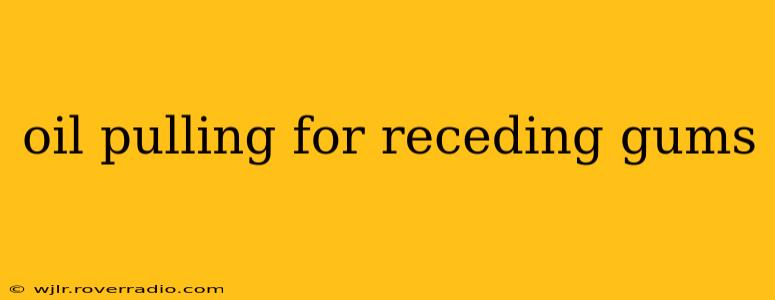Receding gums, a common dental concern, can lead to tooth sensitivity, increased risk of cavities, and even tooth loss. While professional dental care is crucial for addressing receding gums, many are exploring alternative therapies like oil pulling. But does oil pulling actually help with receding gums? Let's delve into the science and explore the potential benefits and limitations of this ancient practice.
What is Oil Pulling?
Oil pulling is an ancient Ayurvedic practice involving swishing oil around in your mouth for several minutes. Proponents believe it detoxifies the mouth, improves oral hygiene, and offers various health benefits. While primarily used for oral health, some believe it can address issues like receding gums. The most commonly used oil is coconut oil, known for its antimicrobial properties.
Can Oil Pulling Help with Receding Gums?
The short answer is: potentially, but not as a primary treatment. Oil pulling's benefits primarily stem from its ability to reduce plaque and bacteria in the mouth. By removing harmful bacteria, it may indirectly help improve gum health and reduce inflammation, which can be a factor in gum recession. However, it's essential to understand that oil pulling does not address the underlying causes of gum recession.
What Causes Receding Gums?
Understanding the root causes is crucial. Receding gums are often caused by:
- Aggressive brushing: Brushing too hard can damage the gum line.
- Gum disease (gingivitis and periodontitis): These infections damage the tissues supporting the teeth.
- Genetics: Some individuals are predisposed to gum recession.
- Hormonal changes: Fluctuations in hormones can affect gum health.
- Teeth grinding (bruxism): This puts excessive pressure on the gums.
- Smoking: Smoking significantly increases the risk of gum disease.
How Effective is Oil Pulling for Receding Gums?
While anecdotal evidence suggests some improvement in gum health with oil pulling, scientific evidence supporting its effectiveness for receding gums is limited. Most studies focus on its antimicrobial properties and potential to improve oral hygiene. More research is needed to definitively determine its impact on receding gums. It's important to note that oil pulling should be considered a supplemental practice, not a replacement for professional dental care.
Does Oil Pulling Prevent Gum Recession?
Oil pulling may contribute to better oral hygiene, reducing the risk of gum disease, a major contributor to gum recession. However, it's not a preventative measure on its own. Maintaining excellent oral hygiene practices, including gentle brushing, flossing, and regular dental checkups, is essential for preventing gum recession.
What are the Side Effects of Oil Pulling?
Generally, oil pulling is considered safe, but some potential side effects include:
- Lip irritation: If done too vigorously.
- Ingestion of oil: Accidentally swallowing the oil can cause digestive upset.
- Risk of choking: Especially for children.
When Should I See a Dentist About Receding Gums?
If you notice receding gums, it's crucial to consult a dentist immediately. They can properly diagnose the cause of the recession and recommend appropriate treatment options, which might include scaling and root planing, gum grafts, or other procedures. Early intervention is key to preventing further gum recession and potential tooth loss.
Conclusion: Oil Pulling and Receding Gums
Oil pulling might offer minor benefits in improving oral health and potentially reducing inflammation, but it's not a cure for receding gums. It's a complementary practice, not a substitute for professional dental care. Prioritize regular dental checkups, maintain excellent oral hygiene, and consult your dentist if you experience receding gums to address the underlying cause and receive appropriate treatment. The information provided here is for educational purposes only and does not constitute medical advice. Always consult with a qualified healthcare professional for any health concerns or before making any decisions related to your health or treatment.
